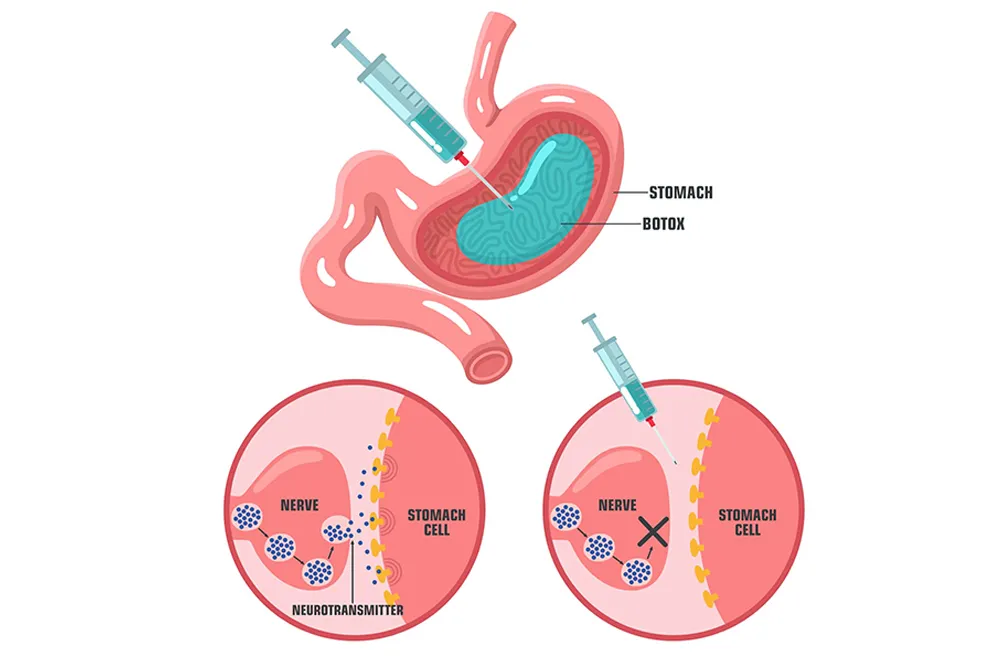Gastric Botox, also known as Botox injection therapy for weight loss, is a medical procedure that has gained attention in recent years as a potential solution for those struggling with obesity. This procedure involves injecting Botox (Botulinum toxin) into the muscles of the stomach, aiming to reduce appetite and promote weight loss. Despite its growing popularity, research on gastric Botox is limited, and the risks and success rates of the procedure are not yet fully understood.
How Does Gastric Botox Work?

Botox is a neurotoxin that works by blocking signals sent from nerves to muscles, resulting in reduced muscle activity. When injected into the stomach muscles, Botox is thought to slow down the rate at which food is emptied from the stomach into the small intestine. This process can lead to a feeling of fullness and reduced appetite, which might help with weight loss.
Potential Benefits of Gastric Botox
While the idea of gastric Botox as a weight loss treatment may sound promising, it is crucial to understand the potential benefits clearly. These include:
- Reduced Appetite: By slowing down stomach emptying, gastric Botox can help reduce feelings of hunger.
- Non-Surgical: Unlike bariatric surgery, gastric Botox is a minimally invasive procedure that does not involve significant surgical intervention.
Risks and Side Effects of Gastric Botox
The use of Botox for weight loss is not without its risks. Some of the potential side effects include:
- Nausea and Vomiting: Common side effects post-procedure.
- Abdominal Pain: Patients might experience discomfort in the stomach area.
- Diarrhea: Gastrointestinal disturbances can occur.
- Muscle Weakness: There’s a risk of Botox spreading to other parts of the body, causing muscle weakness.
- Difficulty Swallowing and Breathing Problems: In rare cases, Botox can affect muscles involved in swallowing and breathing.
Limited Research and Mixed Results
Research on gastric Botox as a weight loss treatment is still very limited, and the available studies have shown mixed results. Here are some key findings:
- 2014 Study in Gastroenterology Research and Practice: This study found that gastric Botox led to modest weight loss in obese patients over six months. However, the weight loss was not sustained, and participants regained most of the weight within a year.
- 2018 Study in Obesity Surgery: This study involving 75 participants found that gastric Botox was no more effective than a placebo injection in promoting weight loss. Both groups followed the same diet and exercise regimen, with no significant difference in weight loss between the Botox and placebo groups.
- 2019 Study in Obesity: This study followed 60 patients who underwent gastric Botox injections and found that only 20% lost more than 5% of their body weight. Furthermore, most of the patients regained the weight they had lost within a year.
Cost Considerations
In addition to the risks and limited success rates, the cost of gastric Botox is a significant factor. According to the American Society for Metabolic and Bariatric Surgery, the cost can range from €1,000 to €2,000 per treatment. Since multiple treatments are usually required, the long-term cost can be unsustainable for many patients considering this as an alternative to surgery.
Alternatives to Gastric Botox
Given the limited success rates and potential risks, it’s important to consider other weight loss procedures that have shown to be more effective, such as:
- Bariatric Surgery: This involves making changes to the digestive system to reduce the amount of food the stomach can hold, leading to significant and sustained weight loss. However, it is more invasive and carries its own set of risks and complications.
- Healthy Diet and Regular Exercise: Developing sustainable habits through balanced nutrition and physical activity remains the most effective way to achieve long-term weight loss.
Conclusion
While gastric Botox may sound like a promising solution for those struggling with obesity, the limited research and mixed results suggest that it is not a reliable long-term weight loss treatment. Individuals considering the procedure should fully understand the potential benefits and drawbacks before making a decision. Gastric Botox is not a replacement for a healthy diet and regular exercise, which are still the most effective ways to achieve long-term weight loss.
Consult with a Medical Professional
It is essential to consult with a qualified medical professional who can provide personalized guidance and help individuals make an informed decision based on their specific needs and health conditions. A healthcare provider can offer insights into the most suitable weight loss strategies, considering all available options and potential risks.
Other Weight Loss Procedures
- Endoscopic Sleeve Gastroplasty: A non-surgical procedure that reduces the size of the stomach using an endoscopic suturing device, leading to weight loss.
- Gastric Balloon: Involves placing a balloon in the stomach to reduce space for food, promoting a feeling of fullness and reducing appetite.
Final Thoughts
In summary, while gastric Botox may seem like an appealing option for those struggling with obesity, it is important to approach the procedure with caution and fully understand its potential risks and limitations. While some studies have shown modest weight loss in the short term, the long-term success rates are still unclear. The potential risks and side effects must be carefully weighed against the benefits. Ultimately, the most effective and sustainable way to achieve weight loss is through a combination of healthy eating, regular exercise, and personalized medical guidance.









